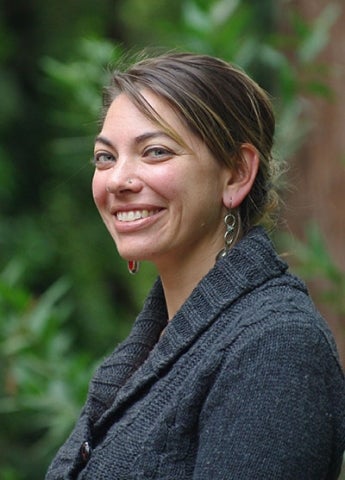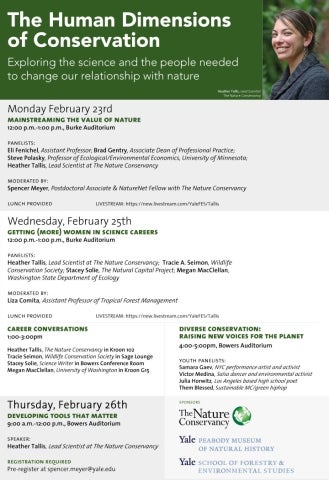Can you talk about nature in terms of jobs, income and health? A growing number of conservationists say that not only is the answer “yes,” but that quantifying the benefits of these so-called ecosystem services offers the best hope to slow the degradation of the global environment.
Yet despite advances in the science of ecosystem services, there has been little progress in applying it to policy on a large scale. In a paper co-authored by
Heather Tallis, Lead Scientist with The Nature Conservancy, a team of experts wrote last year that the promise of ecosystem service science “will remain unrealized” until there are standardized operating procedures for making it happen.
Next week, Tallis will be part of a panel discussion on the state of ecosystem services, and how scientists, policymakers and corporate leaders might achieve such a system of global standards. The event —
at noon, Feb. 23 — will be hosted by the Yale School of Forestry & Environmental Studies (F&ES). (Other participants of the panel, which
will be available via livestream, include
Stephen Polasky, a professor of ecological/environmental economics at the University of Minnesota;
Brad Gentry, a professor at F&ES and the Yale School of Management; and
Eli Fenichel, a professor of economics at F&ES.
Spencer Meyer, a NatureNet Science Fellow at F&ES, will moderate the discussion.)
Tallis was also lead author of a
Nature article signed by 240 scientists —
including members of the F&ES community — calling for an open mind when it comes to describing why we care about nature, and for more diversity in the conservation field.
In an interview, Tallis discusses why countries have been slow to adopt policies that reflect the value of ecosystem services, how scientists can better communicate these benefits to the private and public sectors, and the role universities can play in bridging these worlds.
Q: For years scientists and policymakers have been developing the science of ‘ecosystem services.’ What does the term mean to you?
HEATHER TALLIS: To me, ecosystem services are all the benefits that people get from nature. That includes immediate material benefits — like food and water — but also the immaterial things that are not as easy to value monetarily, like spiritual opportunities and health benefits. I’m interested in the whole spectrum, some of which are easy to value and some of which aren’t.
Q: What’s an example of an ecosystem service that we should more effectively ascribe a monetary value?
TALLIS: There are lots of examples. I think water is perhaps the easiest example to understand — and obviously one that becomes more and more pressing every day. Watersheds are the places where our water comes from. And often, the way they’re managed today, pollutants are added and water is taken out along the flow path before it gets to people who want to drink it. So, we can invest in restoring forests or grasslands and protecting the natural systems that are already in place, and use those as filters for our water supply systems in addition to the filtration plants we already have now. That’s one of the opportunities that has received investments pretty extensively already in some parts of the world, especially Latin America.
Q: Despite these benefits, you wrote last year that implementation of policies has been slow. What obstacles have slowed progress?
TALLIS: I think there are two big ones. One is awareness. To continue the water example, in many parts of the world a lot of people don’t even know where their drinking water comes from. And so when they’re making policy decisions about how to supply clean water to people, nature isn’t part of the solution.
The other part is what we addressed in our paper; even when there is awareness, people have to be able to act on that in a way that matches the way they manage resources. What we’re missing in a lot of cases is that connection between the fantastic science that tells us there are these possibilities and the actionable process of bringing that information to play. In the paper, we suggested that a big missing piece is having standards that match current business and government processes. There are a lot of opportunities to make that connection now — and that’s one of the things we’ll highlight during the panel discussion.
Q: Who should be involved in developing these standards?
TALLIS: We as scientists need to work with the existing standard-setting bodies. For example, the United Nations sets the global standards for national accounts. When you hear about GDP, that’s calculated in a similar way in every country because the UN sets that standard. So for us as a scientific community to influence that standard we need to work with the UN Statistics division to revise how they set those standards now. And for just about everything that we’re interested in influencing there’s an existing standards body.
Another one is the Financial Accounting Standards Board, which sets corporate accounts standards in in the U.S. If we want natural capital to be part of the equation in corporate accounts, scientists have to be directly engaged with them.
Q: Are you optimistic that there will be buy-in from government and private sectors worldwide?
TALLIS: I am. There’s already huge buy-in in a few arenas. We’ll talk about some of them during the panel. One is with these national accounts, and in that case the World Bank has done what we would like to see; they started an initiative in which they brought the scientists together with the standard-setting body to move natural capital information into national accounts. There’s already something like 70 countries that have committed to creating these kinds of accounts once those standards are in place.
And it’s happening in other arenas. The International Finance Corporation — the part of the World Bank that makes loans to the private sector — has already made a requirement that companies do impact assessments on ecosystems services whenever they’re proposing development projects through that funding. Again, they’re missing a standard — they don’t have a way to act consistently on that yet.
Ecosystem services seem to be one of the few cases where the public interest and the policy interest is ahead of the science. So I’m really optimistic because of that. If scientists can show up to the right tables now, there are a lot of open doors.
Q: What part can academic institutions play in mainstreaming nature into wealth accounting?
TALLIS: I think they can play a huge role in bringing their experts into the processes that are moving forward. Explicitly, they could do that with the World Bank through the Wealth Accounting and Valuation of Ecosystem Services process that’s already ongoing and needs expert input. In cases where there’s not already someone working with the standards boards, universities and their experts can create that entity and create that direct input mechanism through which the science can flow.
Q: Do you have any suggestions for students who might be tackling these issues — whether it’s in the scientific sector, policy, or business?
TALLIS: I think a big thing they need to do is to become familiar with that uptake path that they want to influence. Go and find out who’s making the rules, and who’s setting the standards for the things they care about. Become familiar with them and do your work in line with those entities instead of being rogue scientists who publish yet another academic framework for ecosystem services.
Q: The field of conservation is going through a lot of change right now. What are some of the other big challenges you see?
TALLIS: One of the other issues I’m going to talk about while I’m at Yale is the diversity of voices in conservation. This is something that builds off a paper
published in Nature late last year — in which 240 other people joined me — that called for us to do a better job of reflecting all the voices interested in conservation. We have huge challenges to overcome and a lot of people with creative solutions, but we need them
all to be engaged in the discourse and in the communication that happens between our community and the rest of the world.
While I’m at Yale, there will be two other panels focused on that piece specifically: elevating the voices of women and of youth. I think these are key missing pieces that must be filled if we are to have the broadest conversation we can about conservation.
Q: How has this lack of inclusiveness held back the field of conservation?
TALLIS: One of the big risks we have in keeping these people out of the conversation is that people have a very ‘old school’ view of what conservation
is today — and not in a very good way. I think a lot of people in the public and the policy sectors still think conservation is a one-trick game: that protection is the be-all-end-all of what we’re trying to accomplish. But conservation has moved well beyond that. We work in agricultural lands and in cities, in very complicated landscapes in complicated ways. By not having the voices present that can talk about those activities and the real solutions conservation can put on the table, we’re missing opportunities to connect with a lot of the general public that might resonate with the different things that conservation
is and
does.
Q: You’re the first female lead scientist at The Nature Conservancy. How significant is that for you personally? And has the role presented any challenges that you might not have foreseen?
TALLIS: It’s incredibly significant for me. I went through all of my schooling in classes dominated by women; at every university I went to, we represented more than 50 percent of the student body. And yet in every university I went to, our faculty and our mentors were mostly men. So it was tough to look up at where I wanted to be and not find many females who were in leadership positions. So I’m very, very happy and thankful to have an opportunity to sit in one of those positions now, and hopefully be one of those people whom women coming up in the field can connect with and see as a real example of where they can go.
Honestly, a major challenge that I didn’t expect had more to do with cultural and economic representation than with gender. I’ve spent most of my research time in developing countries, so I’ve been worked closely with people who were extremely effective and innovative in moving conservation science and practice forward in those very different and very challenging contexts. From the position I’m in now, I’ve noticed even less representation of those experiences, which is really frustrating. And I think it places the field at a much poorer position than if we could elevate those perspectives.
 Heather Tallis
Heather Tallis
 <p> On Wednesday, Feb. 25, <strong>Heather Tallis</strong> will also participate in a panel, <a href="http://environment.yale.edu/calendar/listing/2681"><strong>Getting (More) Women in Science Careers</strong></a>, at F&ES and moderate a panel with young artists using their voices creatively for conservation. <a href="https://environment.yale.edu/calendar/day/2015-02-25">Read more</a>.</p>
<p> On Wednesday, Feb. 25, <strong>Heather Tallis</strong> will also participate in a panel, <a href="http://environment.yale.edu/calendar/listing/2681"><strong>Getting (More) Women in Science Careers</strong></a>, at F&ES and moderate a panel with young artists using their voices creatively for conservation. <a href="https://environment.yale.edu/calendar/day/2015-02-25">Read more</a>.</p>